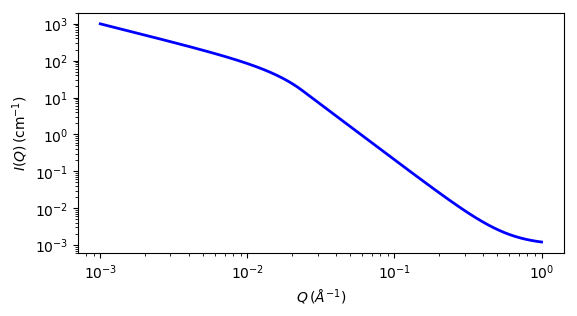guinier_porod
Guinier-Porod function
Parameter |
Description |
Units |
Default value |
|---|---|---|---|
scale |
Scale factor or Volume fraction |
None |
1 |
background |
Source background |
cm-1 |
0.001 |
rg |
Radius of gyration |
Å |
60 |
s |
Dimension variable |
None |
1 |
porod_exp |
Porod exponent |
None |
3 |
The returned value is scaled to units of cm-1 sr-1, absolute scale.
Calculates the scattering for a generalized Guinier/power law object. This is an empirical model that can be used to determine the size and dimensionality of scattering objects, including asymmetric objects such as rods or platelets, and shapes intermediate between spheres and rods or between rods and platelets, and overcomes some of the deficiencies of the (Beaucage) unified_power_Rg model (see Hammouda, 2010).
Definition
The following functional form is used
This is based on the generalized Guinier law for such elongated objects (see the Glatter reference below). For 3D globular objects (such as spheres), s=0 and one recovers the standard Guinier formula. For 2D symmetry (such as for rods) s=1, and for 1D symmetry (such as for lamellae or platelets) s=2. A dimensionality parameter (3−s) is thus defined, and is 3 for spherical objects, 2 for rods, and 1 for plates.
Enforcing the continuity of the Guinier and Porod functions and their derivatives yields
and
Note that the radius of gyration for a sphere of radius R is given by Rg=R√3/5. For a cylinder of radius R and length L, R2g=L212+R22 from which the cross-sectional radius of gyration for a randomly oriented thin cylinder is Rg=R/√2 and the cross-sectional radius of gyration of a randomly oriented lamella of thickness T is given by Rg=T/√12.
For 2D data: The 2D scattering intensity is calculated in the same way as 1D, where the q vector is defined as

Fig. 107 1D plot corresponding to the default parameters of the model.
Source
Reference
B Hammouda, A new Guinier-Porod model, J. Appl. Cryst., (2010), 43, 716-719
B Hammouda, Analysis of the Beaucage model, J. Appl. Cryst., (2010), 43, 1474-1478
Authorship and Verification
Author:
Last Modified by:
Last Reviewed by: